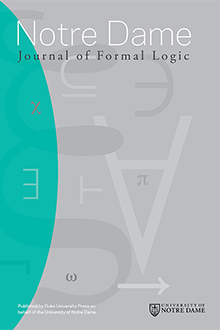Abstract
The formula $\triangle$A (it is noncontingent whether A) is true at a point in a Kripke model just in case all points accessible to that point agree on the truth-value of A. We can think of $\triangle$-based modal logic as a special case of what we call the general modal logic of agreement, interpreted with the aid of models supporting a ternary relation, S, say, with OA (which we write instead of $\triangle$A to emphasize the generalization involved) true at a point w just in case for all points x, y, with Swxy, x and y agree on the truth-value of A. The noncontingency interpretation is the special case in which Swxy if and only if Rwx and Rwy, where R is a traditional binary accessibility relation. Another application, related to work of Lewis and von Kutschera, allows us to think of OA as saying that A is entirely about a certain subject matter.
Citation
Lloyd Humberstone. "The Modal Logic of Agreement and Noncontingency." Notre Dame J. Formal Logic 43 (2) 95 - 127, 2002. https://doi.org/10.1305/ndjfl/1071509431
Information





